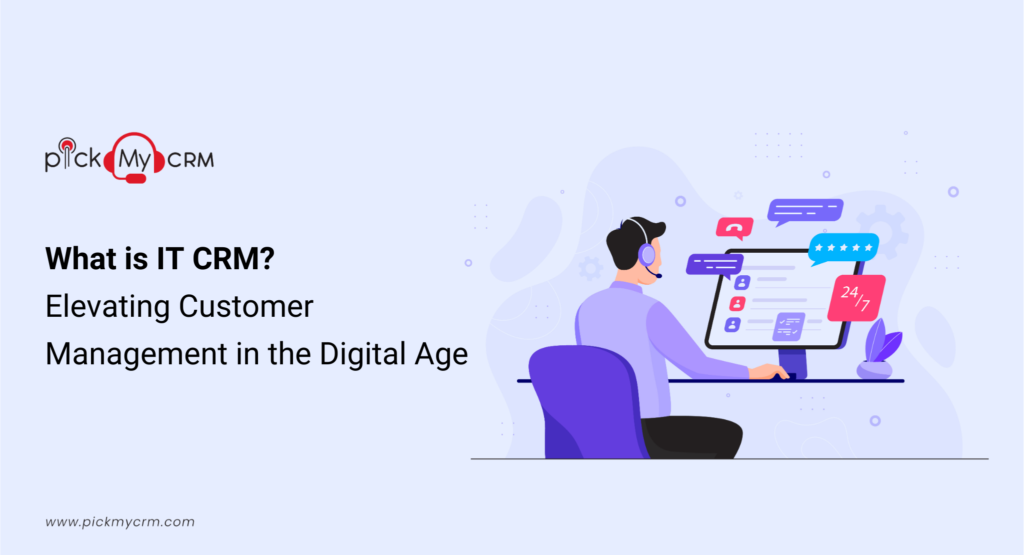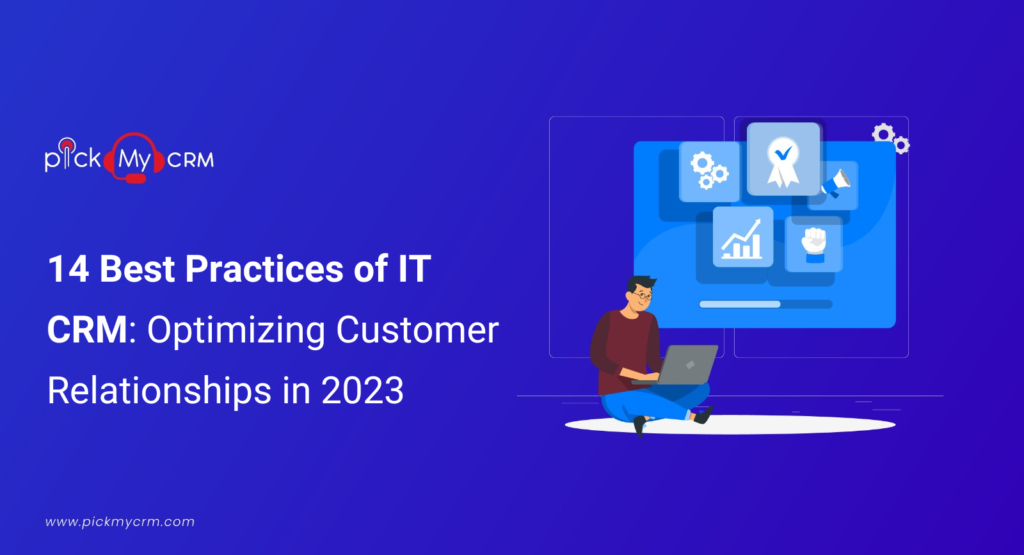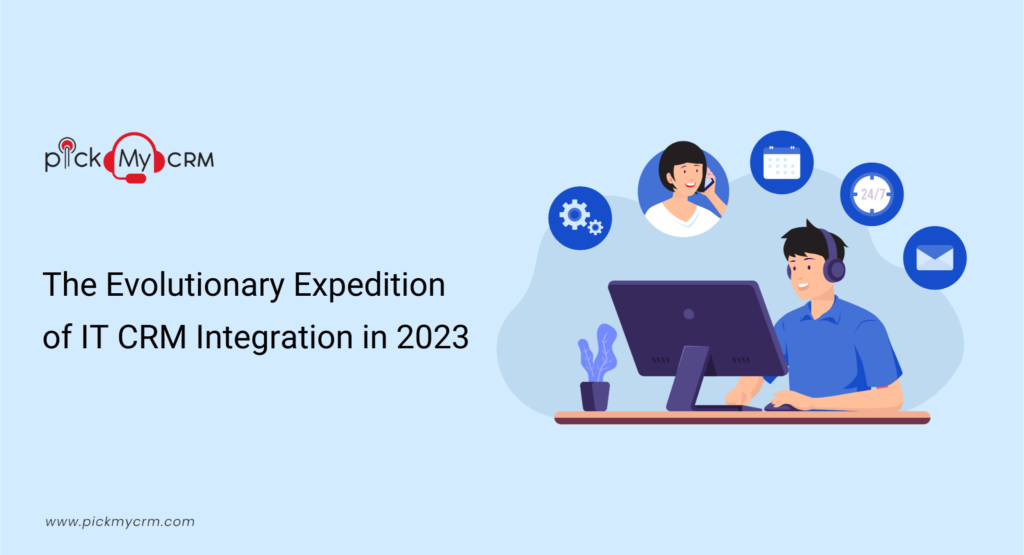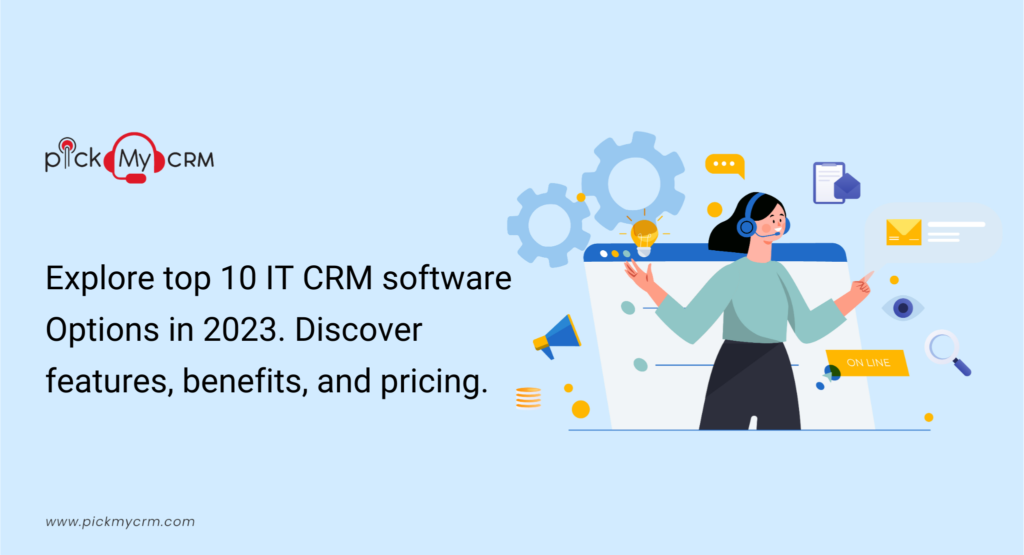What is IT CRM? Elevating Customer Management in the Digital Age
What is IT CRM?
IT CRM is a specialized application of Customer Relationship Management within the Information Technology sector. At its core, it involves the strategic implementation of software and processes designed to facilitate the efficient management of customer interactions and data. IT CRM is customized to meet the unique needs of IT professionals and businesses amid its broader industry applications.Forging a Customer-Centric IT Landscape: The Nexus of IT and CRM
In a swiftly evolving tech landscape, the harmonious fusion of IT and CRM emerges as a pivotal bridge connecting the Realms of technology and human engagement. This powerful synergy transcends conventional IT paradigms, infusing customer interactions with technology-driven insights that redefine the digital frontier.Deciphering the IT-CRM Synergy
Peering beyond the surface, the essence of CRM within the IT context unfurls—a strategic convergence that goes beyond software deployment. It orchestrates a symphony of processes, data, and human interactions, intricately weaving customer-centricity into the very fabric of IT operations.Unveiling the Arsenal of CRM in IT
The arsenal of CRM for IT boasts a formidable array of software tools and platforms, propelling businesses toward unparalleled customer engagement and operational finesse. As IT professionals harness these tools, they witness the metamorphosis of mundane tasks into strategic maneuvers that mold the trajectory of customer interactions.Crafting Empathetic IT Solutions
The advent of CRM in the IT landscape initiates a profound transformation—shifting from detached technical transactions to nurturing personalized, empathetic relationships. This evolution reverberates throughout the domain, giving rise to IT solutions intricately attuned to the unique pulse of the customers they diligently serve.Why Does IT CRM Matter?
IT CRM matters significantly in today's digital business landscape for several compelling reasons,Centralization of Customer Data
IT CRM systems Serve as centralized repositories for storing customer information, including contact details, interaction history, and preferences. This centralization Enables IT teams to have a comprehensive view of each customer, facilitating personalized and efficient communication.Efficient Support Management
In the IT sector, managing support requests is crucial. CRM systems streamline the tracking and management of support tickets, ensuring that Issues are Addressed promptly and systematically. This efficient support process enhances customer satisfaction.Knowledge Base Integration
Many IT CRM systems include knowledge bases with solutions for common technical issues. Customers can access these resources to find answers to their problems independently. It not only Empowers customers but also reduces the workload on IT support staff.Communication Integration
IT CRM platforms often integrate with various communication channels, Such as email, chat, and social media. This integration guarantees the logging and effortless accessibility of all customer interactions. It also enables IT teams to respond to customer inquiries and issues Promptly, improving the overall customer experience.Analytics, Automation, and Workflow Integration
CRM for IT employs analytics to offer actionable insights from customer data. Automation streamlines tasks like ticket assignments and emails, boosting efficiency. It integrates seamlessly into IT workflows, aiding developers with feedback and aligning sales strategies for an improved customer experience.Data-Driven Insights
CRM systems provide analytics and reporting tools that offer insights into customer behavior and team performance. These insights guide decision-making, helping businesses make informed choices regarding resource allocation, customer engagement strategies, and process improvements.Scalability
IT CRM systems are Designed to adapt to the evolving needs of businesses. As customer bases grow and IT operations expand, CRM systems can scale to accommodate increased demands while maintaining service quality. IT CRM matters because it enables businesses to deliver exceptional customer experiences, optimize support processes, make data-driven decisions, and operate efficiently. In a digital world where Customer expectations are high, IT CRM is a strategic necessity for IT departments and businesses seeking to thrive and remain competitive.How Does IT CRM Work?
IT CRM systems collect data from diverse sources, including customer inquiries, support tickets, and communication channels. This data is stored in a centralized database, Enabling IT professionals to access and modify customer information as required. Automation plays a significant role, helping streamline repetitive tasks such as ticket assignments and email responses. Analytics and reporting tools provide insights into customer behavior and team performance, guiding decision-making.Who Benefits from IT CRM?
All stakeholders in the IT ecosystem benefit from Customer Relationship Management implementation. IT support teams can manage inquiries more efficiently, developers gain insights into user preferences, and sales teams can tailor their strategies based on customer interactions. Ultimately, customers enjoy quicker issue resolution and tailored solutions.The Benefits of IT CRM
IT CRM offers several significant benefits,- Enhanced Customer Experience: Deliver exceptional service, ensuring rapid issue resolution and personalized support to achieve heightened customer satisfaction.
- Improved Collaboration: Teams collaborate more effectively on support cases, leading to quicker problem-solving.
- Data-Driven Insights: Analytics help businesses make informed decisions and allocate resources efficiently.
- Increased Efficiency: Automation reduces manual workload and errors, enhancing overall efficiency.
- Scalability: IT CRM systems can adapt to accommodate growing customer bases and evolving business needs.
- Strategic Planning: Allocate resources effectively and stay competitive.
- Competitive Edge: Foster loyalty and agile responses for a unique position.
- Remote Work: Enable remote collaboration for distributed teams.
- Cost Savings: Enhance efficiency and satisfaction for a Stronger bottom line.
When and Where to Implement IT CRM?
CRM for IT holds significance across diverse sectors, spanning software development, managed services, and beyond. Early implementation in a company's growth journey establishes a robust base for customer-centric approaches. Significantly, cloud-based CRM solutions provide adaptability and accessibility, enabling seamless team collaboration regardless of geographical constraints.Top 3 IT CRM in 2023
HubSpot CRM (Best CRM Software Overall)
Overview: HubSpot is celebrated for its inbound marketing tools and provides an extensive Customer Relationship Management platform. It's highly intuitive and suitable for both small businesses and larger enterprises. HubSpot provides solutions for marketing, sales, service, and content management. Benefits and Features- Contact and lead management.
- Email tracking and templates.
- Sales and Marketing automation.
- Reporting and analytics.
- Free plan available with basic features.
- Advanced features can be costly.
- Limited customization options.
- Learning curve for new users.
- HubSpot is well-received for its user-friendly interface and ease of use.
- Users appreciate the seamless integration with HubSpot's marketing and sales tools.
- Some users may find limitations in terms of advanced features compared to enterprise-level CRMs.
- Free Tools: $0 per month (Basic features)
- Starter: Around $30 per user per month
- Professional: Around $1,780 per month (Starting price)
- Enterprise: Starts at around $5,000 per month
Salesforce (Best for Sales Teams)
Overview: Salesforce is one of the longest-standing and most extensive CRM solutions accessible, encompassing marketing, sales, and customer support procedures. It excels, especially for medium-to-large operations. Benefits and Features- Centralized customer database.
- Lead and opportunity management.
- Automated marketing and sales processes.
- Customer support and case management.
- Analytics and reporting.
- Extensive app marketplace (AppExchange).
- Extensive features may overwhelm small businesses.
- High pricing.
- Learning Curve for Effective Use.
- Salesforce consistently receives Positive ratings for its feature-rich CRM solution.
- User feedback often highlights its scalability and robust functionality.
- Salesforce's large user community provides extensive online resources and support.
- Starter: Around $25 per user per month
- Professional: Around $75 per user per month
- Enterprise: Around $150 per user per month
- Unlimited: Around $150 per user per month
Pipedrive (Best for Pipeline Management)
Overview: Pipedrive focuses on boosting sales and revenue. It tracks customer communication, manages leads and deals, and automates tasks. It's known for its visual approach to monitoring sales processes and activities. Benefits and Features- Straightforward and ideal for small businesses.
- Excellent at managing sales pipelines.
- Competitive pricing.
- Integration options with various apps.
- Primarily focused on sales, lacks advanced marketing tools.
- May not have Features required by larger enterprises.
- Less Suitable for businesses with complex sales processes.
- Essential: Around $9 per user per month
- Advanced: Around $19 per user per month
- Professional: Around $39 per user per month
- Power: Around $49 per user per month
- Enterprise: Around $59 per user per month
Features of IT CRM
- Contact Management facilitates a centralized customer database for easy access to vital information.
- Ticket Tracking enables efficient monitoring and management of support requests.
- Knowledge Bases provide a repository of solutions for common issues, aiding self-service.
- Communication Integration seamlessly connects with email and chat platforms.
- Analytics and Reporting offer insights into customer behavior and team performance.
- Automation streamlines repetitive tasks, enhancing overall efficiency.
Types of IT CRM
- Operational CRM: Streamlines customer-facing processes like sales and support.
- Analytical CRM: Uses data analysis for insights into customer behavior.
- Collaborative CRM: Enhances internal communication and teamwork.
- Strategic CRM: Aligns goals with long-term business strategies.
- Cloud-Based: Offers flexibility and accessibility through the cloud.
- Mobile: Enables customer management via mobile devices.
- Social CRM: Integrates social media for better customer engagement.
- E-commerce: Optimizes customer relationships in online businesses.
- B2B: Manages complex business interactions in B2B scenarios.
- B2C: Enhances customer experiences in retail and services.
- Campaign Management: Focuses on planning and tracking marketing campaigns.
- Sales Force Automation (SFA) CRM: Automates sales-related tasks, Such as lead management.
Wrapping Up
Within the dynamic realm of Information Technology, Customer Relationship Management emerges as a transformative force. Moving past being a mere software solution, IT CRM intricately integrates customer-centricity into operational frameworks, propelling efficient support, data-driven insights, and seamless collaboration. By fostering meaningful relationships and elevating customer experiences, Customer Relationship Management for IT, whether cloud-based or on-premise, Propels businesses toward operational excellence and paves the way for enduring success in the digital age.FAQs
CRM for IT refers to the strategic implementation of software and processes that facilitate efficient management of customer interactions, data, and support requests in the Information Technology sector.
CRM for IT centralizes customer data, Streamlines support ticket tracking, integrates communication channels, and provides analytics. It empowers businesses to enhance customer experiences and optimize operations.
CRM for IT enhances customer satisfaction, improves collaboration, offers data-driven insights, automates tasks, and adapts to business growth for more efficient operations.
Operational CRM, Analytical CRM, Collaborative CRM, and Cloud-Based CRM are among the types employed in IT. Each serves specific functions such as support management, data analysis, and collaboration.
CRM for IT boosts customer satisfaction, facilitates teamwork, guides decision-making, optimizes resource utilization, and aligns with evolving customer needs, ensuring your business stays competitive in a dynamic digital landscape.




